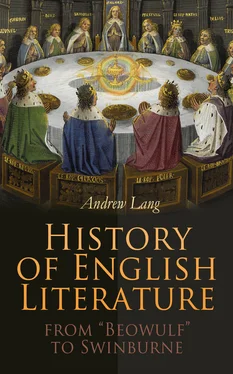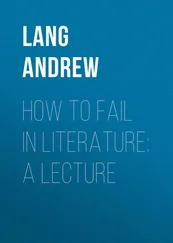"I wes ay reddy all men to begyle," like Chaucer's Pardoner, but perhaps Dunbar was merely copying Chaucer. He is thought to have been attached to the Scottish Embassy in Paris, and he may have read, in print, the works of the famous burglar poet, Francois Villon. His recognized Masters, however, were Chaucer, Gower, and Lydgate.
From 1500 to the great defeat of Flodden (1513) and the death of James IV, Dunbar was a priest and poet at the Court of that magnificent prince, in whose days Scotland was peaceful, comparatively rich, and addicted to letters and the arts. Her poets, a century after Chaucer, and eighty years after their Royal leader, James I, were all Chaucerians, but were confessedly more vigorous, tuneful, more original in genius, and much less prolix and pedantic than the English Chaucerians, Lydgate, Gower, and Hawes. But what Dunbar lacks in length, he more than makes up for in breadth. He made Court poems on the Royal marriage of "The Thistle and the Rose" (Margaret, the Rose, was really as prickly as the Thistle). He was but thriftily rewarded, and emitted many rhymed petitions for money. Benefice he got none.
Probably, like Dean Swift, he was thought no credit to his cloth, even in days far from respectable. As Chaucer was styled "Old Grizzle," so the Scot speaks of himself as "this gray horss, Auld Dunbar". At about 48, and in sickness, he wrote his "Lament for the Makaris," the dead "makers" or poets, including Chaucer, Gower, and Lydgate, with the recurring burden, Timor mortis conturbat me , "Fear of Death disturbeth me". In 1511 he was with the Queen at her reception in Aberdeen, which he celebrated, as he had already made immortal the filth and stench of Edinburgh, a town famous for its dirt till after Dr. Johnson's time. His humorous poems, his satires on society and clergy, are coarser than the English poetic attacks. His Three Wanton Wives, "Two Married Women and the Widow," is inspired by Chaucer's "Wife of Bath's Tale," or rather by the prologue.
Historically, these poems are full of matter, with their pictures of a society not more pure than that to which Piers Plowman preached, but they have not the gentle and humane wit of Chaucer. Like all the poets following Chaucer, Dunbar shines in descriptions of gardens and woods in spring, though May, in Scotland, is not always what his fancy painted it, indeed these vernal glories are borrowed from the verse of sunny France—
The sun rises fair in France,
And fair sets he,
But he has tint the bonny blink
He has in my ain countrie,
writes the Jacobite exile, accustomed at home, only to a "blink" or gleam of the sun through clouds. After 1520, or thereabouts, Dunbar saw no more of the sun.
Dunbar, with his satires, "flytings," Court poems, allegories of the usual kind, rhymed petitions, poems of penitence and faith, and the rest, was versatile enough, and wrote in many forms of verse, even in the old unrhymed alliterative cadences ("The tua Mariit Wumen and the Wedo"). To his glory be it said that this, his longest piece, is only of 530 lines. He also used the heroic rhymed couplet, "Riding Rhyme," and the rhymed octosyllabic couplet, strophes of various arrangements, and even the tripping French triolet.
One allegorical poem, "The Golden Targe," full of classical mythology and the usual praise of May, contains the lines
O reverend Chaucere, Rose of rethoris all,
As in our tong are flour imperiall,
"rethoris," being masters of rhetoric.
Dunbar escapes from Venus and other gods, and from a crowd of allegorical people—including Danger, of course,—at the end of 278 lines. Apparently Scotland did not love the long-winded style. The "flyting" combines with rhyme copious alliteration.
For wealth of strange coarse terms of abuse Dunbar may compare with Urquhart, the translator of Rabelais. A poem to the young Queen is unspeakably nauseous. In short to be plain, it is not easy to see why Dunbar has been reckoned above James I and Henryson; while Barbour, with a chivalrous heart and a spirited story, is infinitely more agreeable and profitable than the Court-haunting priest of James IV. In Scotland, Dunbar at no time has been so popular as the poets already mentioned. He praises Chaucer, but the lesson of Chaucer he never fully learned.
Blind Harry, or "Henry the Minstrel," is a mysterious personage. Who was Harry? John Mair or Major (1469-1550) (?) is not an accurate historian; the Antiquary, in Scott's novel, calls him "a pillar of falsehood". Major says that, in his own infancy (say 1480) a man blind from his birth wrote "Schir William Wallace," and supported himself by chanting it to the nobles. The manuscript is of 1488. A few entries of small sums paid to "Blind Harry" occur in the Royal accounts, ending in 1492, and Harry was dead when (1508) Dunbar printed his Lament for poets dead and gone. Harry may have become blind, but can hardly have been blind from his birth. Though he calls himself "a borel man," an unlettered man, he had some education; he was not a ballad maker, but produced a romance of nearly 12,000 lines. He says that he had a Latin source, a narrative written by Wallace's chaplain, John Blair, of which nothing is known.
He is full of anachronisms, and tells long adventures of Wallace with Edward I and his Queen which never occurred. Tradition, already mythical, is his chief source, his Wallace is but little more historical than Grettir in the Icelandic Saga, and like him has dealings with a ghost, that of a slain man, which appears with its head in its hand. Wallace, whose wife, it is said, was slain by the English, is a very bloodthirsty hero; his manslayings and burnings of houses are many. Harry has not too high an opinion of Bruce. His hero, Wallace, has always been, thanks mainly to Harry, the most popular of Scottish heroes. Harry tells his tale with abundant energy; he hates the English infinitely more than the chivalrous Barbour did, and he is perfectly free from the influence of the "Roman de la Rose". His verse is not wholly correct; eight consecutive lines have the following rhymes,—"been, keen, saw, mean, seen, raw, knaw, teir, faw," indeed some passages have a kind of stanza formation, in the Second Book (lines 260-360).
We must not look on Harry as an unlearned maker of Border ballads. He had read Wyntoun, and Chaucer (though he does not make Chaucer his model), and he borrows from the alliterative romance of "Arthur" ascribed to the mysterious Huchown. Moreover, it has been proved, and anybody can see it, that he stole adventures of Robert Bruce from Barbour's poem, and made Wallace, not Bruce, their hero. Harry takes some of Bruce's battles and transfers them to Wallace. "Harry nearly uproots Barbour." Whereas Bruce, on the eve of Bannockburn, cut down Sir Henry Bohun, as he charged, with a blow of his axe, Harry declares that Wallace dealt this very stroke on Bruce's spear and horse's neck. To Wallace he attributes the famous campaign in which Bruce drove Edward II within the walls of York (1322). 1
Harry is, in short, a mystery, and his book, wholly worthless as history, is a colossal perversion of Barbour "The Bruce," with other matter from pure fancy or from unknown legend, while great parts are played by men of Harry's own time, English in-evading knights of 1483.
Sir Richard Holland, or de Holand, a cleric, and a partisan of the House of Douglas during its encounters with the Crown, and its fall under James II, wrote, to please his patroness, the Countess of Moray, and to flatter the Douglas, "The Buke of the Howlat," the Owl. The poem, in stanzas of thirteen lines, rhyming and alliterative, begins with the usual dream and leads up to a kind of allegorical "Parliament of Fowls". The allegory is entangled, the poet's real desire is to glorify his patrons with their motto,
Читать дальше












